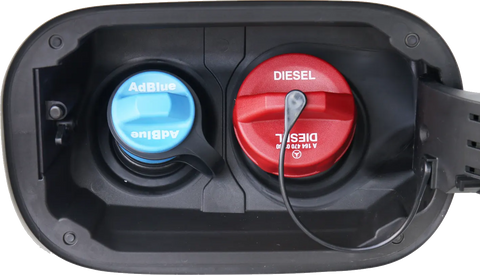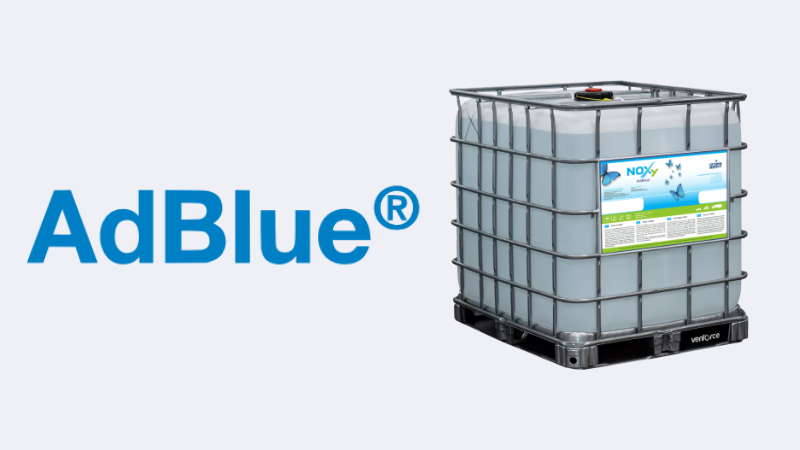Adblue - What's the product?

Truck drivers are facing a shortage of AdBlue that has led to higher prices and frustration at truck stops across Europe. Unfortunately, there is no clear solution to the shortage at this time. But what's AdBlue and how does it work? Keep on reading in order to understand the significance of this product.
What is AdBlue and how does it work?
AdBlue is an aqueous solution made of urea and de-ionised water (and not pig urine!) that helps to reduce emissions from diesel cars. When used in conjunction with a Selective Catalytic Reduction (SCR) system, such products can significantly influence exhaust emissions.
How does AdBlue work?
It's injected into the AdBlue tank of a diesel car where it breaks down emissions before they're released into the atmosphere. When it's sprayed into the exhaust system, the urea reacts with the Nitrogen Oxides (NOx) as a chemical reaction and forms harmless nitrogen and water vapor instead of harmful gases.
This technology is called Selective Catalytic Reduction (SCR) and it's becoming more common as emissions standards get stricter. The European Union has mandated its use for all new vehicles since 2006. Some older cars don't have it yet.

Does AdBlue affect fuel consumption?
There's no evidence that the AdBlue fluid influences fuel consumption. This additive is added into an AdBlue tank and the fuel tank is separated from it. You don't have to worry about higher fuel consumption, but there are more expenses as you consume between 4 to 8 % of the diesel consumption.
The Benefits of Using AdBlue
Using AdBlue in your diesel vehicle can help your vehicle meet stringent emission standards as those set by the Euro 6 emission standards. In fact, to top up the importance: Many car makers now require the use of AdBlue in order to maintain warranty coverage on their vehicles.
AdBlue shortage in Europe - What are the consequences for the economy?
You may have heard about the shortage of AdBlue in Europe. The supply has been hit hard in recent months, resulting in a shortage across Europe. It's having a knock-on effect on the transport industry as a whole.
As a result, prices for AdBlue have increased significantly. According to the German association, it also affects 10 % of car owners in Germany and as a result, many people who were planning on buying a diesel vehicle are now reconsidering their options. This could have a huge effect on the sales of cars and trucks.
Why is there an AdBlue shortage?
The main reason for the shortage is the global increase in prices because of the war in Ukraine. The production costs are four times higher than a year ago. That's also the reason why many people are looking for alternatives and electric car manufacturers are experiencing growing demand. We have also witnessed an increased request for solar panels as a consequence.
What are the consequences?
The biggest effect is an increase in the price of transport. This is because businesses that use diesel vehicles are having to pay more for AdBlue. The extra cost is likely to be passed on to consumers in the form of higher prices for goods and services. This could lead to inflationary pressure on the economy.
Which cars use AdBlue?
All diesel cars manufactured must use an AdBlue tank to reduce emissions and many older diesel cars are being retrofitted with the system as well. Some of the most popular car brands that use AdBlue include:
-
Audi
-
BMW
-
Ford
-
Mercedes-Benz
-
Volkswagen

What happens if you run out of AdBlue?
If your car runs out of AdBlue and has a Selective Catalytic Reduction (SCR) converter, the engine's power will reduce in order to limit emissions. The truck will still run in limp mode, but it won't restart as soon as you turn the engine off.
Run out of AdBlue? Buy the best for your diesel engines
Products from online retailers such as Venforce are the perfect way to buy affordable AdBlue. It is a high-quality urea solution that helps reduce emissions. It is injected into the AdBlue tank of a diesel engine and that way, diesel cars exhaust gases that contaminate not as much.
Our AdBlue is formulated to meet an international standard to ensure optimal performance in SCR systems. It is also backed by a team of experts.
Why should you choose Venforce AdBlue?
There are several reasons why you should choose to buy Adblue in our store. Here are some:
It’s a fantastic product for your diesel engine
It has the perfect concentration for maximum effectiveness – Our AdBlue technology is designed to provide optimal results in SCR systems. This way you can be sure you’re getting the most out of it.
Fast delivery
As soon as you order, we're preparing the product you purchased. That way you can be sure to receive your AdBluewithin a few days. Fill it into the AdBlue pumps, with the top-up, and you won't lose any liquid.
We’re always here to help
Our team of experts is available Monday through Friday to answer any questions you have and help you get the most out of your investment.
We have a proven track record
We only offer high-quality products. Our manufacturers produce AdBlue which fulfills all of the European regulations. Buy AdBlue today in order to have it in stock!
How do you know when your car needs an AdBlue refill and where can you get one done?
There's no need to worry about constantly checking your AdBlue levels - Your car will let you know when it's time for a refill. An amber warning light on your dashboard will turn on when the AdBlue tank is running low.
If you see this light, it's best to get a refill as soon as possible. Depending on how much AdBlue is left in the tank, you may only have a limited amount of time before your car won't be able to start. You can usually get an AdBlue refill done at a nearby gas station or your mechanic.
Can I refill AdBlue myself?
You can refill AdBlue yourself if you're comfortable working with automotive fluids and have all the necessary safety gear as gloves or other protection products. Don't add it into the diesel tank as it's not a Diesel Fuel Additive (DFA)! You can find it at fuel stations or online. To refill your car's AdBlue tank, simply remove the top-up next to the tank or where the spare wheel is and pour the liquid in.
Where is the AdBlue tank?
The AdBlue tank is usually located near the diesel fuel tank or where the spare wheel is. If you're not sure where the top-up is, ask your dealer or look into the vehicle handbook.
What should I do if my AdBlue warning light is on?
If your AdBlue warning light is on, it means that your car needs to be filled up with AdBlue. You should stop at the next gas station as your car or truck won't start as soon as you don't have any AdBlue. Once you’ve added the AdBlue and closed the filler cap, the warning light should switch off within a few minutes.
Is it safe to drive with AdBlue warning lights on?
Yes, it is safe to drive your car with AdBlue warning lights on. However, you should take your car to a qualified technician or refill it as soon as possible.
How much does an AdBlue refill cost on average, and how long will it last for a typical car driver/owner?
The average cost of a liter of AdBlue rose to over 2 €. As the prices are going to increase even higher, you should buy a supply as soon as possible. You can find AdBlue containers that you store comfortably. Here's a breakdown of the rising costs of AdBlue and how long the fluid lasts.
Rising costs in recent months
The cost of an AdBlue refill has risen from around 0,50 € to over 2,00 € in the past few months. This is caused by the increasing gas prices. As fuel prices are also rising, the cost of transportation will continue to increase as well. The consequence is an even higher inflation rate and more expensive products in the supermarket.
How long the diesel exhaust fluid lasts
That depends on your car or truck, the tank size and your driving style. The diesel exhaust fluid lasts for a typical car driver for about 9.500 kilometers. One liter is needed for every 950 km. When the warning light appears, then you usually have enough fluid left for around 2.400 km depending on the tank size. However, this will also vary according to your driving style or if you drive heavy lorries.
Are there any dangers associated with using or refilling AdBlue in your car?
AdBlue is a relatively new product on the market and as such, there is a lot of misinformation floating around about it. AdBlue is perfectly safe to use and there are no risks associated with using it or refilling it in the AdBlue tank. However, there are a few things you should consider before you use AdBlue in your vehicle.
Is AdBlue dangerous?
No, AdBlue is not dangerous. It is made up of mostly water and urea, which is a common fertilizer ingredient. In fact, urea is actually produced naturally in our bodies! However, there are a few things you should keep in mind before using AdBlue in your car:
-
Don't spill it on yourself: AdBlue can cause irritation if it comes into contact with your skin. So be careful not to spill it on yourself when you're filling up your AdBlue tank. If you do happen to get some on your skin, wash it off immediately with soap and water.
-
Don't touch your mouth while working with AdBlue: Although AdBlue is not toxic, it is not meant to be consumed. So please don't touch your mouth before washing your hands!
-
Keep it away from children and pets: AdBlue should be kept out of reach of children and pets. If ingested, it can cause nausea and vomiting.
Can I use water instead of AdBlue?
No, you can't use water instead of AdBlue as it may block the injector and damage the SCR system. AdBlue is a urea solution that's used to reduce nitrogen oxide emissions from diesel engines. With such a product cars exhaust gases that have fewer emissions.
Without AdBlue, diesel engines would produce much higher levels of harmful emissions. Water won't work as an effective replacement for AdBlue, because it doesn't contain any urea molecules. So if you use water instead of AdBlue, your diesel engine will produce much higher levels of harmful emissions and get damaged progressively.
What happens if I put AdBlue in the fuel filler cap?
Putting urea solutions in the fuel filler can cause all sorts of problems.
-
It's not a fuel additive and it won't improve your car's performance.
-
It can actually damage your car's engine and injectors.
-
It corrodes all components and pipework.
So if you're ever tempted to put AdBlue in your fuel filler, just don't do it! There are plenty of other ways to keep your car running smoothly without resorting to this potentially harmful substance.
Did you accidently put AdBlue in the fuel filler? Then you should get your car to a garage as soon as possible. The mechanic will have to change several parts of your car. This should fix any damage that's been caused. You see: If you accidentally put AdBlue in the fuel filler, you'll have to pay for costly repairs.
The future of diesel cars and selective catalytic reduction
Diesel cars have come a long way in recent years. Thanks to advances in technology, today's diesel engines are more environmentally friendly and efficient than ever before. Anyway, with the rising cost of diesel, more and more drivers are turning to fuel-efficient alternatives. But what does the future hold for diesel cars?
The latest advancements in diesel technology
One of the biggest challenges facing diesel cars is reducing the amount of carbon dioxide. In an effort to meet stricter emissions standards, the automobile industry is turning to Selective Catalytic Reduction (SCR) technology. This process can significantly reduce the vehicle's exhaust of emissions without sacrificing power or fuel economy.
Another potential solution for reducing emissions is the use of alternative fuels. For example, Volkswagen and other manufacturers are currently experimenting with other liquids made from CO2 and water.
What Does the Future Hold?
Looking ahead, it's clear that diesel sales will play a less important role in the future of the automotive industry. Even with advances in emissions reduction technology, alternative fuel sources can be expected as they are more efficient and cheaper. As soon as there are important developments, we'll provide you with further information!




